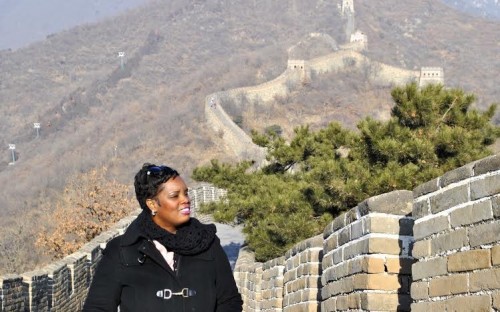The dual degree student — currently completing her final year MA in international affairs and development — has to decide whether to follow the traditional corporate route or move towards international development and the public sector.
Previously Iola enjoyed a successful career in finance, working as a consultant for Robert Half International and for world-renowned companies including Home Depot, InterContinental Hotels Group, Ford and management consulting giant McKinsey & Company.
She now works as an intern at the Overseas Private Investment Corporation (OPIC), the US’ leading international development finance institution, alongside her studies. Combining finance with international development, this could be the perfect role for the ambitious MBA graduate, who is keen to make a difference.
Why did you decide to study for an MBA at that stage in your career?
I wasn’t going any further in my career and my value was stunted without an MBA.
Finance and accounting roles are often very defined. I was worried because it seemed that I was becoming a specialist and getting “boxed in” to the same opportunities. While I loved data modelling and working on forecasts, the focus was narrow and I lacked the opportunity to make a social impact. In my heart I knew that I was not realizing my full potential or using it for a purpose I felt passionate about.
What are your plans for the future?
I must decide whether to continue working in corporate America or make the switch to the public sector. I hope to work within the field of international business development, helping to promote business investment and the expansion of services all over the world and especially in Africa.
I am pleasantly surprised by how much my current role at OPIC seems to suit me! I’m able to apply the business, policy and development knowledge that I’ve gained in an environment that focuses on both international affairs and development and finance.
What was your experience like working for big companies like Ford and McKinsey?
At such high-profile and top-ranking companies, the bar of expectation is set very high.
Ford is more than a company that makes cars. It’s an American institution with a historic legacy and it’s truly on another level in terms of global reach, presence and power. At Ford, reporting and forecasting in the billions is the norm and variance of a few million is considered immaterial. To many people, that’s mind blowing.
At McKinsey, I was contracted to develop an audit report for an accounting department. Coming in, it was pretty clear to me that I had about three weeks to deliver something substantial or I was out of there! The “McKinsey standard” is evident. It was a classy environment. They work hard but also treat each other very well.
Why did you choose to study at GWSB in particular?
GWSB was my dream school and I’d been “courting” it for years!
I used to check the MBA site periodically, read about the courses and look at pictures of students on the fantastic study abroad program. I applied to a number of schools but GWSB was the one that I always wanted.
How was your experience studying for an MBA at GWSB?
It has been a dream come true! The MBA has given me a more high-level [and] well-rounded and strategic business focus.
As an applicant, I was really excited about the program, but also intimidated because it seemed like a world that was miles away from my reality. Now, I can attest that the program is absolutely as robust as it seemed back then. I would definitely recommend it to any prospective MBA students who are seeking a rigorous, experiential, internationally-focused learning program.
What was the hardest thing about the MBA application process?
The essays. I had read that it was very important to make them as authentic as possible. To me, this meant sharing your weaknesses in a sincere yet tactful way that would not reflect very negatively on your candidacy.
There are certain qualities that selection committees look for and the essays provide them with a great deal more insight into a prospective candidate than a transcript, or GMAT or GRE. I would recommend that prospective applicants seek professional, objective feedback on their work.
RECAPTHA :
6b
95
0f
b0








